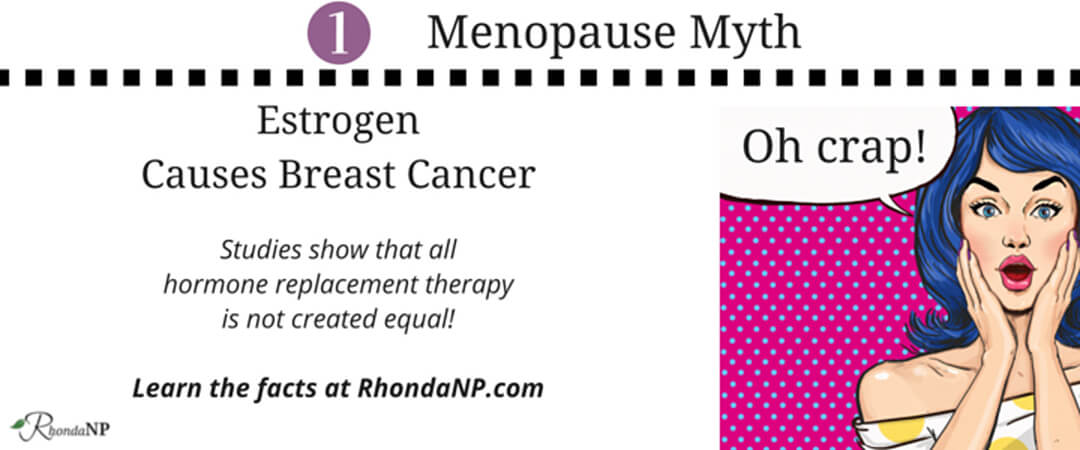Let’s bust this menopause myth – estrogen causes breast cancer.
Do you recall when you heard Elvis died or that Princess Diana was in a fatal car crash? Similar bad news regarding estrogen dropped in 2002 on Women’s Health.
Unlike royal newsworthiness fitting of a King and a Princess, you may not recall the biggest news in Women’s health that hit in 2002. Well, I certainly do. I was in my 5th year of practice and treating many menopausal women with Hormone Replacement Therapy.
I got a phone call from a patient asking if I had heard the news that day stating that Estrogen causes breast cancer. I recall this time vividly as a terror raced across the nation for women who were supplementing with hormones to combat the symptoms of menopause.
The news came as the Women’s Health Initiative study that began in 1991 was stopped early as there were increased associated risks for heart disease and breast cancer.
When the news hit, women immediately stopped their hormone therapy. Over the next few months, the calls and appointments started flooding into the offices of OB/GYN’s and practitioners who prescribed these women the hormone therapy.
Complaints of severe hot flashes, night sweats, mood swings, depression, low libido, weight gain etc. became the norm again after years of control for women in their misery by supplementing with hormone replacement therapy.
Let’s break down the medical history and some key studies
- Estrogen
- In 1942, Premarin arrives on the scene. A medication isolated from pregnant mares becomes the standard of care for women in menopause relieving menopausal symptoms.
- Years later research indicates Premarin carries increased risk of endometrial cancer.
- To combat the risk of endometrial cancer, the introduction of Progestin came and every woman with a uterus was prescribed this drug to protect the uterine lining.
- In 1986, the FDA announced, that Premarin and other estrogens were effective in combating bone loss associated with osteoporosis, and thus were once again prescribed.
- The California Teacher’s Study (CTS), from 1995 to 2004 reviewed data from 71,000 retired female teachers. One of the branches of the study revealed opposite findings of the Women’s Health Initiative. It showed that women ages 34-59 had a decreased risk of cardiovascular disease when using hormone replacement therapy.
- A study in November of 2011 analyzed the bone density of 50,000 women who were on Hormone Replacement Therapy or had discontinued its use. They were followed for 6.5 years and the study revealed a 55 percent increase in hip fractures among those women that discontinued the hormone replacement.
So, what does all of this research tell us?
We have a far greater understanding of women’s health at mid-life than before the Women’s Health Initiative. It is clear that the risks of menopause hormones are different among women who take a combination of estrogen and progestin and those who take estrogen alone.
Ongoing studies conducted after the 2002 scare, reveal that it may be the progestin, or synthetic progesterone, that are the biggest culprit in the risks for heart disease, breast cancer, and osteoporosis. The 2011 studies utilized the use of both bioidentical and synthetic hormone therapy.
Additional studies since 2002 show that estrogen therapy is not linked to a high risk of breast cancer. In fact, certain groups of women taking estrogen therapy who had no family history of breast cancer and those who had no history of benign breast disease had a slightly lower risk of breast cancer. As our understanding of biology and science evolve research gets us closer to the truth.
I believe that the “big scare” media frenzy is one of the biggest disservices in women’s health to date. It has been 14 years since this news hit and to this day, women are refusing estrogen due to the fear of breast cancer. Because of this, many women are putting themselves at a higher risk for heart disease, osteoporosis and questionably Alzheimer’s disease.
So what is a gal to do??
The good news is that even though the ghosts of the “big scare” still exist, studies have refined treatment protocols to guide health care practitioners. There is no “one size fits all” treatment protocol in menopause.
Your Call to Action!
- Talk with your health care practitioner about YOUR unique treatment approach.
- As a consumer of your health care, insist that your practitioner make recommendations based on scientific evidence. Allowing drug companies or marketing hype to dictate patient’s choices isn’t beneficial.
- Discuss your family history because it affects treatment choices.


